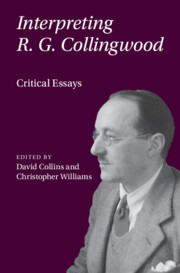Book contents
- Interpreting R. G. Collingwood
- Interpreting R. G. Collingwood
- Copyright page
- Contents
- Figures
- Contributors
- Acknowledgements
- Abbreviations
- Introduction
- Part I Situating Collingwood: Beyond Idealism
- Chapter 1 Collingwood and Logical Positivism
- Chapter 2 On Collingwood’s Criticism of Analytic Philosophy
- Chapter 3 Collingwood and the New Pragmatists on Socially Situated Knowledge
- Chapter 4 Collingwood and Wittgenstein on the Relation between Philosophy and Poetry
- Chapter 5 Collingwood and Phenomenology
- Chapter 6 Revisiting Gadamer’s Critique of Collingwood
- Part II Issues in Collingwood’s Philosophy
- Bibliography
- Index
Chapter 6 - Revisiting Gadamer’s Critique of Collingwood
from Part I - Situating Collingwood: Beyond Idealism
Published online by Cambridge University Press: 22 November 2024
- Interpreting R. G. Collingwood
- Interpreting R. G. Collingwood
- Copyright page
- Contents
- Figures
- Contributors
- Acknowledgements
- Abbreviations
- Introduction
- Part I Situating Collingwood: Beyond Idealism
- Chapter 1 Collingwood and Logical Positivism
- Chapter 2 On Collingwood’s Criticism of Analytic Philosophy
- Chapter 3 Collingwood and the New Pragmatists on Socially Situated Knowledge
- Chapter 4 Collingwood and Wittgenstein on the Relation between Philosophy and Poetry
- Chapter 5 Collingwood and Phenomenology
- Chapter 6 Revisiting Gadamer’s Critique of Collingwood
- Part II Issues in Collingwood’s Philosophy
- Bibliography
- Index
Summary
Gadamer’s attitude to Collingwood was marked by ambivalence: while promoting the Englishman on the one hand, Gadamer claimed on the other that the fundamental dimension of “hermeneutical mediation” had simply escaped him. In this paper, I aim both to assess Gadamer’s debt to Collingwood and the prima facie strength of his objections. First, I reconstruct steps by which ideas of Collingwood found their place in Gadamer’s hermeneutics in the 1950s, including the central “axiom of all hermeneutics”: the thesis that “we can understand a text only when we have understood the question to which it is an answer.” Second, I examine Gadamer’s main objections to Collingwood, the first one being based on a misunderstanding of Collingwood’s stance, while the second one hits home, and I argue in the final section that at issue here is Collingwood’s claim that it is possible to rethink exactly the same thought as that of, say, an historical agent, while Gadamer holds precisely the opposite view, that this is never possible.
Keywords
- Type
- Chapter
- Information
- Interpreting R. G. CollingwoodCritical Essays, pp. 102 - 120Publisher: Cambridge University PressPrint publication year: 2024

